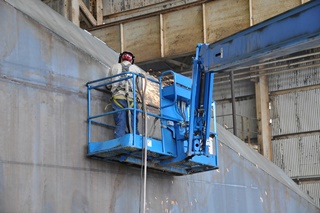Facing $20 million in claims for allegations of abusing Indian guest workers, Signal International last week filed for bankruptcy protection and plans to auction off its assets in the next few months.
The Mobile, Ala.-based shipyard also is expected to issue an apology to the workers, Delaware court filings show. The Teachers’ Retirement System of Alabama and Employees’ Retirement System of Alabama, which own about 47% of Signal’s shares, agreed to provide up to $90 million in financing during bankruptcy and serve as a stalking horse bidder in the sale of Signal’s assets.
Signal’s liquidity has been strained by declining oil and gas prices and by litigation involving the workers, the company said. A settlement agreement and Chapter 11 provide breathing room while Signal keeps its Mobile and Pascagoula, Miss., yards and 302 employees working. The agreement is subject to court approval.
The recent developments come just five years after Signal bought Bender Shipbuilding & Repair’s Mobile assets out of bankruptcy court for $31.25 million. In late 2002, another bankruptcy court approved the sale of Friede Goldman’s Offshore Division to ACON Investments, a Washington, D.C.-based private investment firm, for $18 million cash and the assumption of $49 million in debt. ACON formed Signal to operate Friede Goldman’s Texas and Mississippi fabrication yards.
Signal hired about 500 welders and shipfitters from India through a recruiting service after Hurricane Katrina in 2005. They would do oil rig repair and construction under the federal H-2B temporary worker program at the company’s Mississippi and Orange, Texas facilities. “We can’t find the workers that we need at the same time that our business has increased dramatically," a Signal executive told WorkBoat in late 2006.
Five workers alleged in a suit filed in federal court in New Orleans they were exploited and defrauded through “a broad scheme of psychological coercion, threats of serious harm and physical restraint.” Some paid as much as $20,000 each for the job.
They said they had to live in “guarded, overcrowded and isolated labor camps” with trailer-like bunkhouses that had “insufficient toileting and bathing facilities” and no privacy. Signal deducted $1,050 a month from their paychecks for room and board, according to the suit.
Recruiting ads for the jobs promised they could obtain green cards and thus permanently immigrate with their families to the U.S. “The H-2B guestworker program permits U.S. employers to import foreign workers on short-term temporary visas to meet labor needs when employers attest that they cannot find U.S. workers to perform the available jobs.,” the suit points out.
A jury found against Signal earlier this year and in May the court entered a judgment of $12 million against the company. Signal has been involved in suits in three states resulting in about $20 million in fees and expenses. The company said it has settled with a majority of the remaining 11 suits involving 227 workers and expects more to join the agreement.
“These workers have waited seven long years for justice,” said Jim Knoepp, deputy legal director of the Southern Poverty Law Center, which represented the workers in the New Orleans case. “This agreement and apology from the company will allow the workers to finally move on with their lives.”
In responding to the suit, Signal said it relied on immigration experts to recruit the workers and wasn’t aware of promises made to them. The company also said they were housed “in clean, safe, decent and adequate facility-centered housing.”
In January Signal said it “has always maintained the plaintiffs’ claims are meritless, and has vigorously defended itself for over seven years.” The company said it was confident the evidence would show the workers “could leave their job at any time, were well paid, and free to come and go as they pleased.” Signal could not be reached for further comment.




